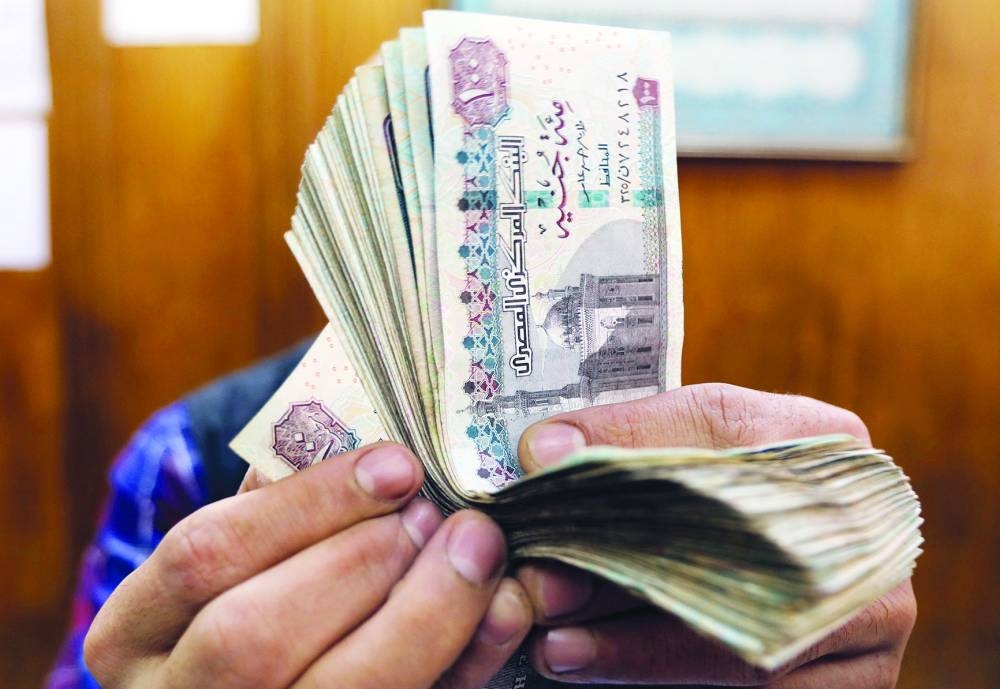Gulf countries are waiting for more certainty on Egypt’s currency and proof it’s making deep economic reforms before unleashing billions of dollars of crucial investment.
Energy-rich allies have earmarked more than $10bn for the North African country, which is in need of foreign exchange and has put stakes in a string of state-owned companies up for sale. Yet only a fraction of the funding has so far materialised, as Gulf officials keep a close eye on the pound in the wake of three devaluations in the past year, people familiar with the matter said.
The Gulf countries also want to see that the North African nation is serious about reforms it promised the International Monetary Fund to secure a $3bn rescue package, said the people, who asked not to be identified as the matter is confidential. Key changes involve reducing the involvement of the state and the military in the economy and ensuring more transparency about the finances of state-owned enterprises and unlisted companies.
Securing Gulf funding is seen as “critical” for Egypt to bridge a funding gap of some $17bn in the next few years, the IMF said last month. The $400bn economy — one of the world’s top wheat importers — is under increasing pressure from the shockwaves of Russia’s invasion of Ukraine, which sent food and fuel prices soaring. Any significant delay to funding is likely to deepen the economic crisis and pile more pressure on the pound.
Gulf countries aren’t making pledges purely as charity. They have historically seen Egypt — the Middle East’s most populous nation — as a key player for upholding the regional order and vital for energy and trade routes.
Talks between Saudi Arabia and Egypt over the purchase of Cairo-based United Bank have already stalled over a disagreement about how to value the transaction, Bloomberg reported Wednesday. Wild fluctuations in the exchange rate make it harder to evaluate assets, which means some deals could take longer than initially expected, the people said. Authorities have pledged to enact a flexible rate, while steep plunges for the pound have been followed by long stretches of stability.
“The ‘wait-and-see’ mode from international investors could put additional pressure on the Egyptian pound. The situation could spill over to Egypt’s debt, as a shortage of funds and a weaker currency increase the burden of servicing external borrowings” says — Ziad Daoud, chief emerging-markets economist at Bloomberg Economics.
When Egypt sought urgent help last year, Qatar, Saudi Arabia and the United Arab Emirates deposited $13bn in Egypt’s central bank. But the country needs foreign direct investment rather than aid, said the people. Hence the pro-posed sale of shares in 32 state entities, including three lenders, within the next year.
Saudi Finance Minister Mohamed al-Jadaan said recently his country will continue to look at investment opportunities in Egypt, though signalled a shift in how Saudi Arabia offers financial help to countries, with aid conditional on promises to revamp their economies. It’s a shift that could also have implications for regional countries from Lebanon to Turkey.
Last year, Saudi Arabia’s sovereign wealth fund bought state-owned stakes in four Egyptian publicly listed companies for $1.3bn, while Abu Dhabi’s wealth fund ADQ agreed to a $2bn deal that included buying about 18% of Egypt’s largest listed lender, Commercial International Bank. Gulf powers, who provided cash deposits and oil during previous crises, now seem determined to see tangible returns on investment.
That could deepen their involvement in Egypt’s private sector, which has long complained it faces unfair competition from state enterprises, particularly those belonging to the military, deterring large-scale foreign investment. Signs of a shift began in late 2019, when President Abdel-Fattah El-Sisi proposed the landmark sale of some firms held by the army, whose commercial interests range from building materials to food, mining and petrochemicals.
The IMF indicated it supports the initiative, setting guidelines such as the submission of financial accounts for state-owned entities to the finance ministry. The institution, however, has warned the changes “may face resistance from vested interests.”
Officials at Egypt’s sovereign wealth fund did a roadshow in the Gulf this month and discussed potential investment opportunities with some countries including Kuwait and Oman. But Egypt also needs to explain to its population the benefits of foreign investment in improving profitability and opening new export markets, according to two of the people. That would help allay any local concern over the sale of state assets.

An employee counts Egyptian pounds at a foreign exchange office in central Cairo. The 00bn economy — one of the world’s top wheat importers — is under increasing pressure from the shockwaves of Russia’s invasion of Ukraine, which sent food and fuel prices soaring.
